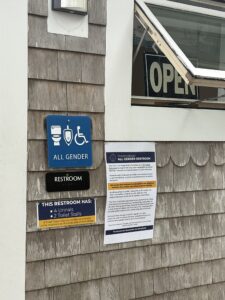PROVINCETOWN — The town is moving forward with plans to renovate its public restrooms to the gender-inclusive standards in the state’s newest building code — a shift that would replace exposed urinals and limited partitions with private, all-gender stalls and partitions that reach the floor.

If the design plans and construction budget are approved at next April’s town meeting, initial construction at the MacMillan Pier Comfort Station — the town’s busiest public restrooms — could be complete before July 2026.
“In a perfect world, we’ll get approval for the funding we need in early April, and then we’ll move as quickly as we can,” Assistant Town Manager Dan Riviello told the Independent. “But that’s a very, very tight window of construction before we’re inundated with our summer visitors.
“We’ll make some if not all of the improvements immediately after town meeting if voters approve them,” Riviello added.
The upgrades would likely be submitted as a capital improvement project request, with funding drawn from free cash reserves, Riviello said. A town working group focused on the gender-inclusive bathroom project is developing a cost estimate this summer and proceeding to design work in the fall, he said.
The need for gender-inclusive restrooms in Provincetown was articulated by eight town residents during public comments at the Feb. 24 select board meeting and by 13 more people at the March 10 meeting.
Many of the speakers said that all-gender restrooms with floor-to-ceiling partitions would make it safer for transgender and nonbinary people to use public facilities without fear of harassment or assault.
“This was a refuge for me and my wife,” said Katie Hodgson, a local speech therapist. “We need to make sure it’s a refuge for our whole community.”
Voters unanimously approved a nonbinding resolution at the April 7 town meeting directing the select board to adopt gender-inclusive standards for town-owned public restrooms.
“There are instances of gender nonconforming, nonbinary, and trans people in town being accosted in binary bathrooms,” Erin Splaine, co-owner of Womencrafts, told the Independent in June. “That’s a real safety problem, and the fact that we, as a town, are finally addressing that issue is important and long overdue.”
“Kansas City has done this; Washington, D.C. has done this; [so have] Lowell, Worcester,” said Jamie G., an architect and transgender activist who spoke to the Independent in July on the condition that his last name be withheld. “I just got kind of fed up” with the lack of progress in Provincetown, he said.
The state’s latest plumbing code, which was last updated in December 2023, calls for gender-inclusive restrooms in public facilities. While those rules do not mandate retroactive changes, new construction and renovation projects are expected to follow the state guidelines on accessibility and gender-inclusive design.
“Each toilet must be separated by lockable partitions that extend from floor to ceiling to provide privacy,” says one section of the code.
A Change in May
After this year’s town meeting vote and before the Memorial Day weekend, the town updated the signs on all town-owned public restrooms to reflect the facilities available inside — including whether there are stalls or urinals — rather than labeling the restrooms for men or women.
The MacMillan Pier Comfort Station is one of the town’s most heavily used restrooms and, Riviello said, the one with the “most awkward setup” before renovation.
On one side of the building, the entrance leads to four urinals and two toilet stalls, while the opposite side includes a row of eight stalls and an ADA-accessible stall.
Denise Joseph, an attendant at MacMillan Pier, said that many women won’t use the side that has urinals in it.
Riviello said he’s received about six emails with “questions or concerns” about the signs but added that feedback during town meeting and in other public meetings has been overwhelmingly positive.
“With the thousands and thousands of people who are using the restrooms, it’s a very small percentage” that have expressed reservations, Riviello said. “We have broad support for the final plan of creating a truly safe, secure, comfortable, inclusive restroom that serves everyone in our community.”
“We can wrangle with our discomfort — just use a stall instead,” said Jamie G. “This is about my right to safety and my community’s right to be protected.”



